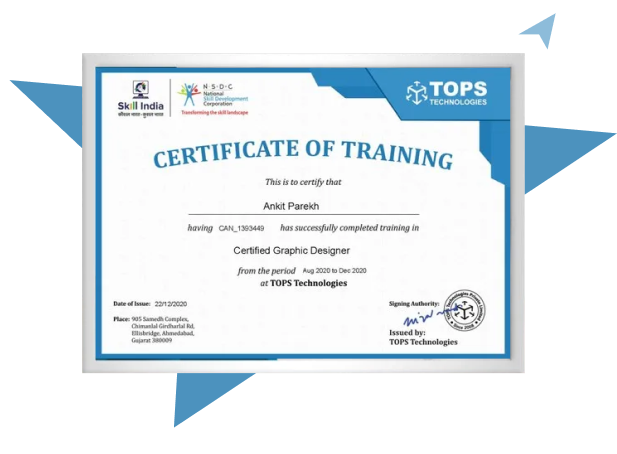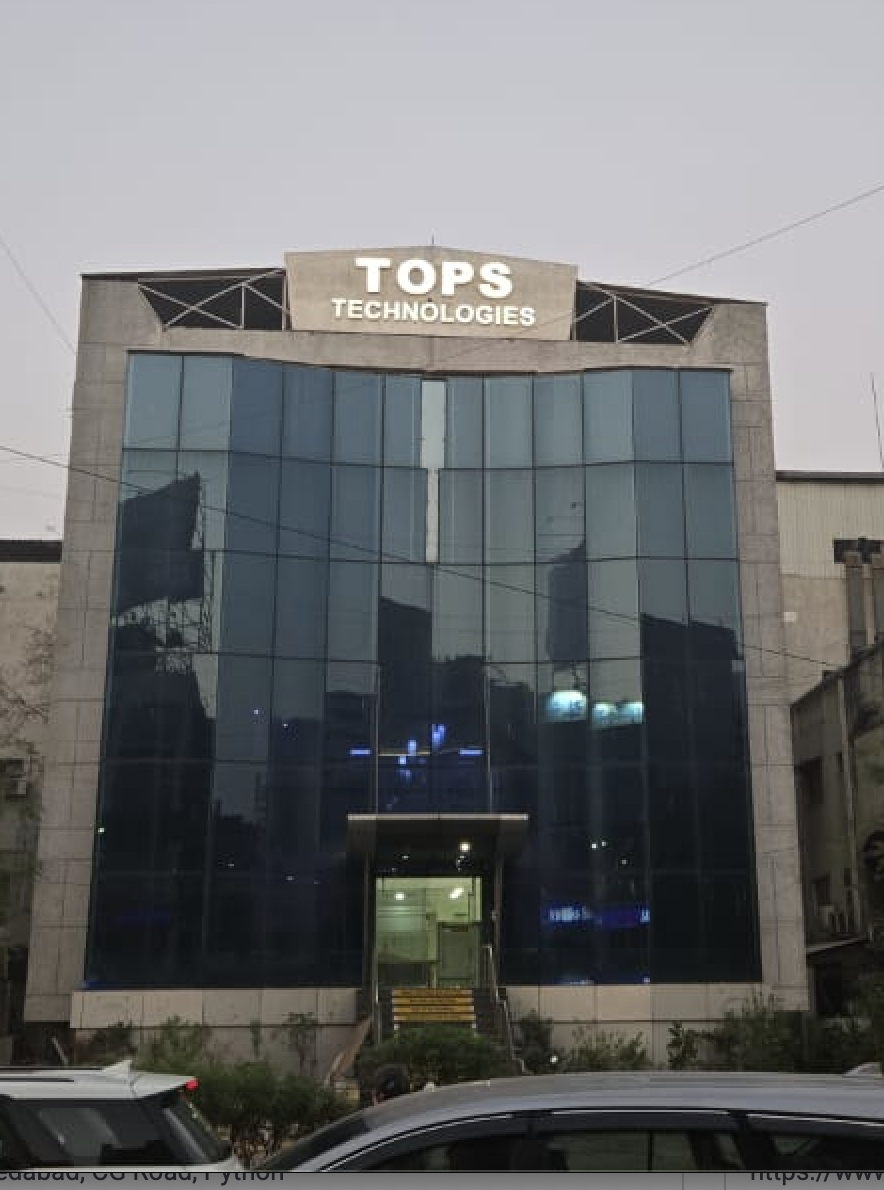Our Facts and Figures
Java is an easy-to-learn and versatile programming language that can make you an ace. Benefit from hands-on training, flexible timings, affordable fees, expert trainers, and Personalised attention. Our Java course offers placement opportunities and is Recognised internationally by NSDC/Skill India. With 19+ offices across India and partnerships with 50+ industry courses, join now and enhance your career with TOPS Technologies' Java Course.
1 Lac+
Student Placed
3000+
Companies TieUp
19+
Offices in India
50+
Industry Courses
Get 100% Job Assistance by enrolling in Certified Java Training Course
Key Highlights
Limited Students Batch
Personalised Attention
Highly Qualified Teachers
Flexible Batch Timings
Interactive Learning
Live Projects
Career Support
Job Oriented Training
Java Course Highlights
Complete Java Course to Learn Java Programming
What is Java?
Benefits Of Java
Industries That Use Java
Customized Java Training
Why Choose Java Course?
Who can enroll in our Java Certification Course at TOPS Technologies?
Become Skilled in Core Java with Our Java Course!
40%
Average Salary Hike
4.5 Lacs
Highest Salary
3000+
Hiring Partners
Join Our Free Upcoming Webinar
Skills you need to Become an Expert Data Analyst
11 Jul 2025, 02:00 PM
Trainer
Rahul Sanghavi CG
(Sr. Technical Trainer)
Learn the Website Hacks and Provide Better Security
11 Jul 2025, 03:30 PM
Trainer
Faruk Pathan
(Sr. Technical Trainer)
Motion Graphics and Animation in Design
11 Jul 2025, 05:00 PM
Trainer
Parth Patel
(Sr. Technical Trainer)
All About Full Stack Development
12 Jul 2025, 10:30 AM
Trainer
Anjali Patel
(Sr. Technical Trainer)
How to Create a Live Website + Internship
12 Jul 2025, 12:00 PM
Trainer
Anjali Patel
(Sr. Technical Trainer)
From Data to Decisions : AI in Smart Industries
12 Jul 2025, 02:00 PM
Trainer
Bhaumik Vyas
(Sr. Technical Trainer)
Career in Digital Marketing
12 Jul 2025, 04:30 PM
Trainer
Sanket Chauhan
(Sr. Technical Trainer)
Android UI Design with Kotlin
13 Jul 2025, 11:00 AM
Trainer
Prakruti Vyas
(Sr. Technical Trainer)
Java Course Curriculum
Download Curriculum- Introduction to Java
- Introduction of Students Career in IT
- Working on Project and Assignment Using Lab
- Conditional Statements (If, If Else, Nested If Else If) (Switch Case)
- Loops (While, Do While, For)
- Break and Continue
- SDLC Process
- Project Analysis
- Analysis In Details
- DFD(with practical)
- Introduction of DFD
- Rules for Drawing DFD
- Context Level
- First Level
- Second Level
- Data Dictionary
- Flow Chart
- Data Dictionary
- Flow Chart
- Introduction of Core Java
- Eclipse IDE
- JVM,JDK,JRE
- Class, Object, Method
- Constructor
- Garbage Collection
- Finalize
- Source File Layout
- Package Management
- Import Statement
- Data types
- Primitive Types
- Reference Types
- Modifiers- Public, Private, Protected, Default
- Conditional Statements and Looping Statements
- Array Introduction
- Why Array? Advantages
- Types of Array
- Resizing Array
- Copying Array
- Primitive types and Reference type Arrays
- Encapsulations
- Inheritance – Introduction
- Advantages of Inheritance
- Types of Inheritance
- Practical of Inheritance
- Practical of Inheritance with Constructor
- Polymorphism
- Types of Polymorphism
- Method Overloading and Method Overriding
- Abstract and Interface – Introduction and Difference
- Keywords – This, Static, Final, Super
- Classes
- Object Class(only Important Methods)
- String Class (Only Important Methods)
- String Buffer & String Builder
- Wrapper Classes
- Exceptions
- Introduction – Why Exceptions
- Types of Exceptions
- Try catch and Finally Block
- Multi-catch Exceptions
- Throw and Throws keywords
- Method Overriding with Exceptions
- Custom Exceptions
- FILE I/O
- What is Stream and Types of Stream
- File Input Output Streams and Its Methods
- File class
- Command Line Arguments
- Thread-Introduction
- Thread Life Cycle
- Creating Threads
- Thread Class Methods (Only Important Methods)
- Runnable Interface
- Synchronized block and Synchronized Methods
- Collection Framework – Introduction
- Collection API
- Hierarchy of Collections
- List and Set and Map Collections
- Array list, vector, and Other Classes
- Generics
- Comparator and Comparables
- JAVA GUI
- AWT (Introduction only) & Swing (in Details)
- Components, Containers, Frame, Window, Panel, Layout
- All Components
- Events, Event Handling
- Database
- DDMS and RDBMS
- Introduction
- MYSQL
- MYSQL IDE
- Query Types
- DDL,DML,DQL, DCL
- Constraints
- Primary Key
- Foreign Key
- Unique Key
- Normalizations
- 1NF
- 2NF
- 3NF
- Joins
- All Joins Types
- Advance Database
- Indexers
- Views
- Procedures
- Functions
- Cursor
- Triggers
- JDBC (Insert, Update, Select, Delete)
- Introduction of JDBC
- Driver Types
- Steps for Creating Connections
- Types of Statements (Statements, prepared Statements and Callable Statements)
- Result Set Interface
- Database Metadata
- Result Set Metadata
- HTML
- UL Tag
- LI Tag
- a Tag
- IMG tag
- Table, TR, TD tag
- Form tags with Attributes
- All input tags
- CSS
- Types of CSS
- Pseudo- Classes
- Margins and Puddings
- CSS background
- CSS using ID and Class
- JavaScript
- Events
- Validations
- Validations with Regular Expressions
- Firebug
- Template Integration
- Introduction of Client-Server Architecture
- HTTP Protocol overview with Request and Response header explanation
- J2EE Architecture Overview
- Web Component Development In Java
- CGI Programming Process Advantage and Disadvantage
- Servlet Programming Introductions
- Advantage and Disadvantage
- Servlet Versions
- Types of Servlets
- Difference between HTTP Servlet a Generic Servlet
- Servlet Life Cycle
- Creating Servlets
- Servlet Entry in web.xml
- Logical URL
- Servlet Config Interface
- Request Dispatcher Interface
- Forward and Include Methods
- Servlet Context Interface
- Web Application Listener
- Scope of Objects, Request, and Response
- Application (Context) , Config
- Java Filters – Introduction
- What are the needs
- Filter Life Cycle
- Process of Execution Filter
- Applying Filter
- Entry in web.xml
- URL Pattern with Filter
- JSP Introduction
- JSP Translation
- JSP Life Cycle
- Comments
- Directives
- Scrip lets
- Expression
- Declaration
- Implicit Objects
- Action
- JSTL
- Custom Tags
- Session Management – Introduction
- What are the needs?
- Session Tracking Technique
- Hidden Form Fields
- URL Rewriting
- Cookies
- Session
- Design Pattern
- MVC Design Pattern with Example
- AJAX Programming With Example
- Introduction to Distributed Technologies
- RMI, EJB and WEB Services Introduction
- Types of web services
- What is Restful Web Services?
- Restful Web Services Annotations
- Restful Web Services with Example
- Hibernate Introduction
- Hibernate Architecture
- Hibernate Configuration
- All Core Interface
- Query and Criteria
- Named Query
- All Relationships
- One to One
- One to Many
- Many to One
- Many to Many
- All Database Operations with hibernate
- Overview Of Spring Framework
- Introduction of Spring Framework Architecture
- Core Container
- AOP (Aspect Oriented Programming)
- Spring DAO (Data Integration)
- Web
- Spring Using IDE
- Using Library
- Spring Hello World Example
- Spring IOC Container
- Bean Factory
- Application Context
- Spring Bean Definition
- Configuration
- Life Cycle
- Inheritance
- Scopes
- Spring Dependency Injection
- Constructor-based
- Setter Getter based
- Inner Beans, Aliases, and ID-ref
- Collections and References
- Auto Wiring
- Spring AOP
- AOP Term
- Write the Aspects
- Configure Where the Aspects
- Spring ORM
- Spring MVC Web Forms
- Spring Form Handling
- Spring Form Tags
- Spring Controller XML and Annotation Based
- Spring MVC with Session Management
- Spring CRUD Operation using Hibernate ORM
- Cloud Computing – Introduction
- Types
- Hosting
- The Project Definition for this Java Live Project was an Online News Portal. It allows the News publisher to publish his news and the user can select the news he wants to read. The project was developed using cutting edge technology in Java using advance
- This Live project was rated as the best java project ideas was built in Java and allows a user to find cheap and efficient parking in and around where the user is. The system using gps tracking on the mobile phone and finds the most effective parking spot
- This Java Project was built for the government java course admission process. The student Management system allows the tracking of all the students, their daily attendance, Java Classes, Java Certification grades. All the information about Java Training i
Our TOPS Training Centers in India
Course Key Features
Skills Covered
Job Roles
Get Training Certificate by Government
Recognized NSDC/Skill India

- National Skill Development Corporation
- Supported by the vision of PM Shri Narendra Modi
- Certification by NSDC SkillIndia
- Valid for all Jobs and College Training
- International Recognition

Student Reviews
Yagnesh Rana
I completed Java Course from TOPS Technologies Vadodara Branch from the Expert Team of Trainers which enhanced...
Read MoreArpit Patel
I completed java Course from TOPS Technologies Baroda Branch from the Expert Team of Trainers which enhanced m...
Read MoreHemal Pandya
There was good experience to learn JAVA with with experience and supportive faculty
Read MoreDevanshi Jani
It was a great experience studying Java in Tops Technologies.
Hitesh M Chariya
At Tops Ttechnologies I got excellent knowledge in Java. It is really good for my knowledge and future.
Read MoreRajat Acharya
It was nice experience. Faculties are good, they have good knowledge of the field. I have enrolled with Java T...
Read MoreRiva Raichura
The experience in TOPS technologies was great. I have learnt many new things in Java here.
Read MoreRAVI JAGANI
Good experience with Training in Java development. Learned concept from basic to advance with support of Heman...
Read MorePankaj Chavda
It's a good experience to learn Java and got very good knowledge about Java. The company environment and work...
Read MoreHiren
This institute is the best for Java and very helpful for me. All the staff is friendly with student. Thank you...
Read MoreBikash Das
Good technical environment and really technically sound support staff. Any one who want to practically improve...
Read MoreAkshay Bakulchandra Patwa
Learning at Tops Technologies was very good. All the faculties supported very well during the Java course time...
Read MoreAakash Joshi
It was really nice experience with Tops Technologies. The practical knowledge the Java faculty delivered, help...
Read MoreAnkur Dharsandiya
Tops Technologies is best training center to learn Java programming.
Mohammad Rahil
I have learned lots of things in Java. It was excellent experience. Thank you Tops Technologies for giving me...
Read MoreChintan
Best Java Training and placement institute. Best to learn any language from Tops Technologies.
Read MoreDhruvdev H Brahmbhatt
It was a nice experience to do Java Training at Tops Technologies. Faculties are really good and cooperative w...
Read MoreNikunj Shantilal Patel
My experience was fabulous for Java and I will recommend my other friends to do classes here at Tops Technolog...
Read MoreDilip Patni
It's a very good experience here to take Training in Java. l learned a lot. Thank you Tops Technologies.
Read MoreFAQ
The fees for the Java Course may vary depending on the length of the program and the specific institute that is offering it. Depending on the institute, the course fees could range from a few thousand rupees to a few lakhs of rupees.
Enroll in our Java course at TOPS Technologies and increase your chances of landing a high-paying Java job.
Yes, TOPS Technologies offers Java Live Project Training. Our expert trainers will teach you the basics of Java programming and help you create interactive applications using Java Live Projects.
You will learn how to design, develop and deploy projects using the latest tools and technologies. This Java Programming Certification Course at TOPS Technologies is perfect if you want to learn how to create custom web applications, deploy them online or use them in your business. With TOPS Technologies' training, you'll be up and running with Java programming in no time!
Looking for a good career in Java? With plenty of software companies looking for Java developers, there are plenty of opportunities to land a great job in this dynamic field. Here are a few tips on how to get started:
1. Check out job boards and websites related to Java development. Many resources are available online, so it's important to do your research and find the best ones.
2. Attend coding boot camps: These intensive courses teach you all Java programming basics, so if you want to take the plunge into this field, then attending one is a great way to start. There are many boot camps available, so it's important to choose one that's right for you and your skill level.
3. Network: It can be tough to find jobs as a beginner developer. Still, by networking with other developers and professionals, you'll be able to put yourself in better positions when applying for jobs or finding freelance work. There are many meetups and coding clubs organised around India, so make sure to check them out!
Doing a Java Course from a Java Training Institute like TOPS Technologies can help you secure your future in this field. With our assistance, you will be able to get a high-paying job. So what are you waiting for? Enroll now!
Yes, TOPS Technologies offers a Java Course with placement assistance. Our well-trained and experienced instructors will teach you the key concepts of Java programming language so that you can create sophisticated applications.
With our assistance, you can easily find a suitable job after completing our Java Training. So why wait? Register today and start your journey to becoming a skilled Java programmer!
Recent studies and reports show that the average salary for a Java Developer is up to INR 7 Lakhs per year. However, each candidate's pay scale may differ based on experience and skills.
Enroll in our Java Programming Training at TOPS Technologies and get placed in a reputed company with a high package.
Yes, TOPS Technologies offers Java Interview Preparation for Freshers. With years of experience in the field, TOPS Technologies has a team of experts who can help you ace your Java interview. Our preparatory Java Classes are designed to equip you with all the knowledge and skills required for a successful Java interview.
We offer various courses, including the Java Basics course covering data structures, control flow, and exceptions. The Advanced Java Course covers advanced concepts like object-oriented programming and web development with Java.
Our experienced trainers will guide you through each module and ensure you are fully prepared for your Java interview. We also provide practice questions so that you can test your skills before the actual interview.
If you want to get ahead in your career as a Java developer, then our Java Classes are worth taking!
Java developers need skills in programming, software engineering, and design. Many Java developers also need knowledge of database technologies such as MySQL or Oracle. Here are the skills needed to become a Java developer:
Skills in programming include familiarity with object-oriented programming (OOP) concepts and experience using Java syntax and class libraries. Java engineers should also be skilled in version control systems such as Git or SVN.
Developers must know design patterns and object-oriented testing approaches. Finally, understanding databases are essential for working with data in Java applications.
Many Java developers also need knowledge of web development frameworks such as Spring MVC or Hibernate. These frameworks make it easy to create web applications that are responsive and scalable.
Other common skills among Java developers include proficiency with source control systems such as Git or SVN, networking abilities, and experience working with various languages, including JavaScript and HTML5.
Enrolling in TOPS Technologies, one of the best Java Institutes will help you learn all of these skills and get started on your journey!
Java boasts several core features:
- Platform Independence: Java programs run on any device with a JVM.
- Object-Oriented: Encourages modular, reusable, and organized code.
- Robust and Secure: Eliminates issues like memory leaks, supports exception handling, and includes built-in security features.
- Multithreaded: Enables simultaneous execution of multiple threads for better performance.
- Portable: Bytecode can be executed on any platform without recompilation.
- High Performance: With optimizations like Just-In-Time (JIT) compilation, Java offers near-native performance.
Java is a versatile, object-oriented, and platform-independent programming language. It was created to enable developers to write code once and run it anywhere, thanks to the Java Virtual Machine (JVM). Java is widely used for building web applications, mobile applications (especially Android), desktop software, enterprise-level solutions, and embedded systems. Its strong typing, robust libraries, and scalability make it a preferred language for developers across the globe.
Java was developed in 1995 by James Gosling and his team at Sun Microsystems, which was later acquired by Oracle Corporation. Initially designed for interactive television, Java evolved to become one of the most prominent programming languages used in multiple domains.
Interview Questions
Java is a compiled, object-oriented programming language used for building standalone applications, while JavaScript is a lightweight scripting language used for web development.
An interface defines a contract that classes must follow, with only method signatures. An abstract class, however, can provide some method implementations and may include instance variables.
Exception handling in Java uses try-catch blocks to handle runtime errors, allowing the program to continue execution after catching exceptions and preventing program crashes.
Polymorphism is the ability of a method to take different forms, enabling objects to behave differently based on their class, helping in code reusability and flexibility.
Method overloading occurs when two or more methods in the same class have the same name but different parameters. Method overriding happens when a subclass provides its own implementation of a method already defined in its superclass.
- JVM (Java Virtual Machine): Executes Java bytecode.
- JRE (Java Runtime Environment): Includes JVM + libraries required to run applications.
- JDK (Java Development Kit): Includes JRE + development tools (compiler, debugger, etc.).
Java has two types:
- Primitive Data Types: byte, short, int, long, float, double, char, boolean
- Non-Primitive Data Types: String, Arrays, Classes, Interfaces
- ArrayList: Faster for random access, slower for insertion/removal.
- LinkedList: Slower for access, faster for insertion/removal at ends.
- private: Accessible only within the class.
- default (no modifier): Accessible within the same package.
- protected: Accessible within package and subclasses.
- public: Accessible from everywhere.
Multithreading is a process of executing multiple threads simultaneously to maximize CPU utilization. Java supports multithreading using the Thread class or implementing Runnable.
Latest Blogs
Everything You Need To Know About Java
Do you want to do a Java course? Java has been popular among tech developers over the past few years...
View full BlogWhy Has Java Become So Popular?
Java is a very effective programming language that is utilized by millions of individuals all around...
View full BlogTips & Tricks to Learn Java Efficiently
With the world growing increasingly digital, the demand for skilled programmers is on the rise. This...
View full BlogBust Common Myths about Java Programming
Not sure if enrolling for a Java training course will keep you relevant in the current industry? The...
View full Blog








